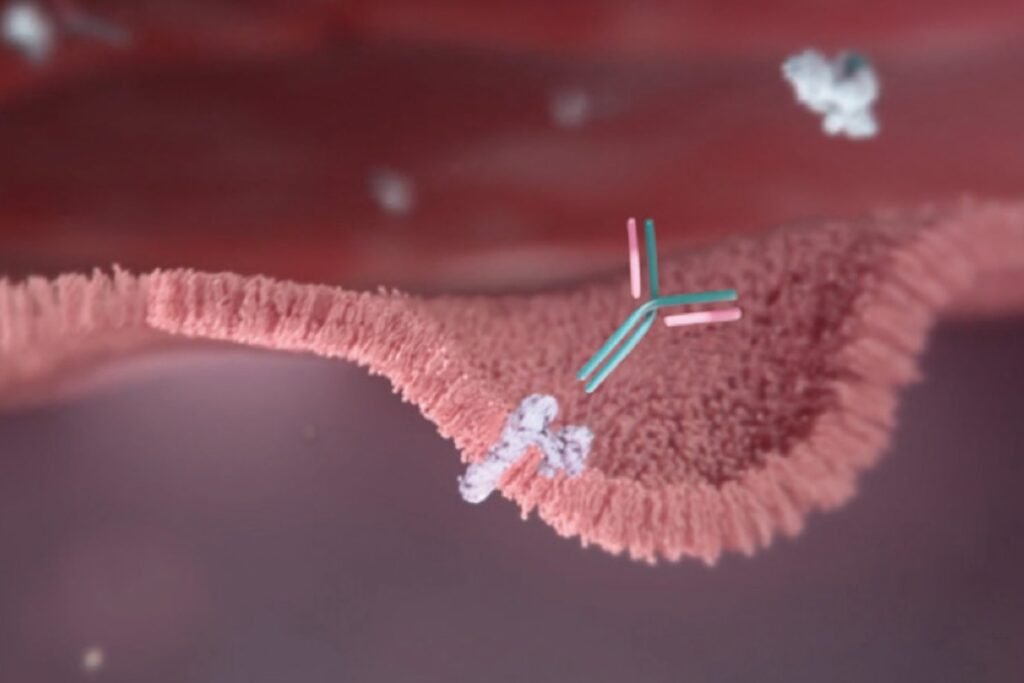Source – AstraZeneca
Promising outcomes emerged from the pivotal Phase III ALPHA trial, revealing that danicopan, an investigational oral Factor D inhibitor, when combined with standard of care C5 inhibitor therapies Ultomiris (ravulizumab) or Soliris (eculizumab), exhibited a notable and statistically significant rise in hemoglobin levels. Additionally, the treatment demonstrated the ability to sustain disease control in patients with paroxysmal nocturnal hemoglobinuria (PNH) who experienced clinically significant extravascular hemolysis (EVH), surpassing the outcomes observed with a placebo in conjunction with established C5 inhibitor therapy. The data were presented on June 9, 2023 at the European Hematology Association (EHA) Annual Meeting.
“While EVH is not life-threatening, its manifestations can be burdensome for patients. The ALPHA trial demonstrated that adding danicopan to standard of care with eculizumab or ravulizumab significantly improved fatigue and anaemia and reduced transfusion dependence, while still allowing for sustained control of IVH with terminal complement inhibition addressing the thrombotic risks associated with PNH. These results suggest danicopan has the potential to be an important option for the small subset of patients with PNH who experience clinically significant EVH while being treated with eculizumab or ravulizumab.”
– Professor Jong Wook Lee, MD, PhD, Department of Hematology at
Seoul St. Mary’s Hospital of The Catholic University of Korea, and investigator in the ALPHA trial
“As a leader in PNH for decades, Alexion has transformed the treatment landscape by developing the first approved medicine for this rare disease and establishing C5 complement inhibition as standard of care. These promising results presented at the EHA Annual Meeting underscore the potential for targeted Factor D inhibition with danicopan as an add-on to Ultomiris or Soliris to address clinically significant EVH while allowing patients to maintain disease control with established C5 complement inhibitors.”
– Gianluca Pirozzi, Senior Vice President, Head of Development, Regulatory and Safety, Alexion
In the prespecified interim analysis of the ALPHA trial, which involved 63 participants completing or discontinuing the primary treatment period of 12 weeks, danicopan successfully achieved the primary efficacy endpoint. When used as an add-on to Ultomiris or Soliris in PNH patients, danicopan demonstrated superiority over placebo combined with Ultomiris or Soliris in terms of the change in hemoglobin levels from baseline to week 12. The least squares mean change from baseline and standard error of the mean were reported as 2.94 [0.211] g/dL for danicopan versus 0.50 [0.313] g/dL for placebo, with a statistically significant difference. Notably, the improvements in hemoglobin levels with danicopan were evident as early as week 2 and sustained through week 12.
All key secondary endpoints also favored danicopan plus Ultomiris or Soliris over placebo plus C5 inhibition, displaying statistical superiority. A significantly higher proportion of patients treated with danicopan (59.5%) achieved a ≥2 g/dL improvement in hemoglobin at week 12 without requiring a transfusion, compared to no patients in the placebo group.
Furthermore, more patients receiving danicopan successfully avoided transfusions and remained transfusion-free through week 12, in accordance with the study protocol. The treatment also showed improvements in fatigue, as assessed by the Functional Assessment of Chronic Illness Therapy – Fatigue (FACIT-Fatigue) score, and in absolute reticulocyte count, another indicator of clinically significant EVH.
Additionally, the change from baseline in lactate dehydrogenase (LDH) at week 12 demonstrated effective control of IVH (intravascular hemolysis) with C5 inhibition in both the danicopan plus Ultomiris or Soliris arm and the placebo arm, with a slight difference that was not statistically significant.





























